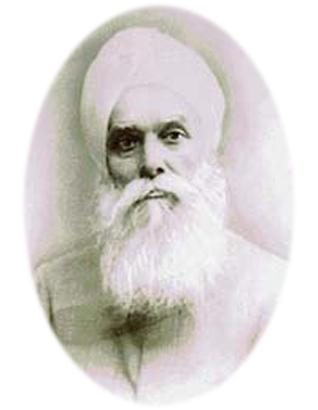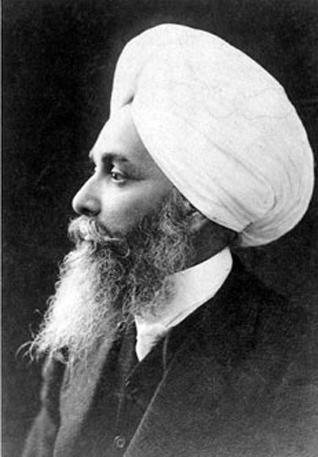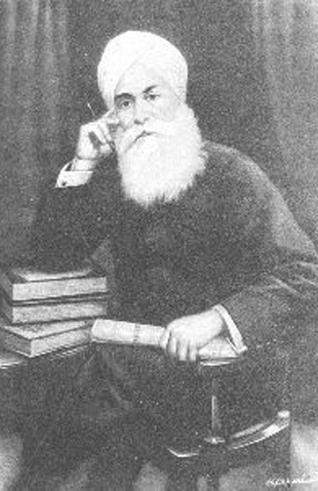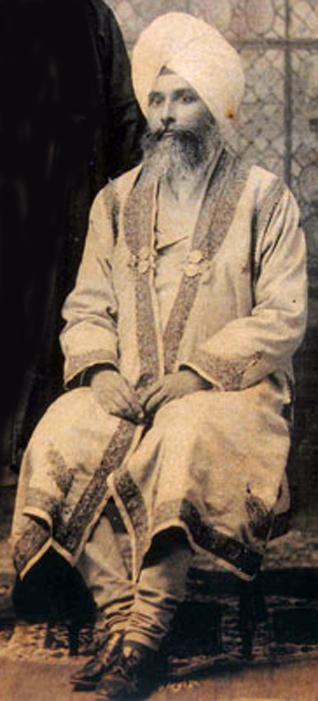Our Heroes
Bhai Kahn Singh: Renaissance Man
by ROOPINDER SINGH
Administrator, diplomat, encyclopaedist, historian, interpreter of Sikh scriptures, sportsman, scholar, and tutor to an heir apparent, Bhai Kahn Singh of Nabha was indeed a Renaissance man who has left a lasting impact on Sikh, Punjab and Punjabi scholarship.
Widely known as the author of Mahan Kosh, the Sikh encyclopaedia in Punjabi that was published in 1930, Bhai Kahn Singh was born on August 30, 1861. His father, Mahant Narain Singh, was steeped in the Sikh tradition and was well known for his ability to recite Guru Granth Sahib.
Like many others of that time, Bhai Kahn Singh received no formal education, but was taught by tutors at home. He became well versed in Hindi, Braj Bhasha, Sanskrit, Urdu, Persian, English and, of course, Punjabi.
Bhai Kahn Singh was taught music by the famous musician, Mahant Gajja Singh. He learnt martial arts from Nihangs and was also a good shot and fond of hunting. He played the sitar and the dilruba with distinction, and was known as a soft-spoken, considerate man, who was always immaculately attired.
As an administrator, he began his innings in 1880, when he started working for Nabha state. He held administrative positions that included City Magistrate, Nazim, Mir/Munshi, Nehar Nazam. The term nazim was used for an administrator and would roughly be equivalent of Collector or Deputy Commissioner.
Bhai Kahn Singh met British administrator Max Arthur Macauliffe in Rawalpindi in 1885. Macauliffe was engaged in research on the Sikh religion and Guru Granth Sahib. Naturally, he relied on a number of Sikhs to help him. Bhai Kahn’s first book, Raj Dharam, had been published a year earlier, and, thus it came as no surprise that Macauliffe asked Maharaja Hira Singh of Nabha to spare Bhai Kahan Singh for three months, so that they could work together.
Years of research went into what became a six-volume work and Macauliffe often visited Nabha and other places to work with Bhai Kahn Singh who, in the meantime, had published Nanak Bhavarth Dipika (1888), Ham Hindu Nahin (1898), Gurmat Prabhakar (1898), Gurmat Sudhakar (1899), Gur Gira Kasauti (1899) and Sharab Nikhedh (1907). He had also come out with two teekaas or exegeses, Jaimant Assamedh (1896) and Visnu Purana (1903).
The Sikh Religion was published by Clarendon Press, an imprint of Oxford Press, in the Unite Kingdom in 1907. Bhai Kahn Singh accompanied Macauliffe to London to assist him in the publication of the book. Macauliffe even transferred the copyright of the book to Bhai Kahn Singh. According to Major A. P. Singh, grandson of Bhai Kahn Singh, Macauliffe also offered his house, 10 Sinclair Road, London, England, to him. Bhai Kahn Singh, however, declined the offer.
Along with his literary pursuits, Bhai Kahan Singh continued to serve the kindom of Nabha and with increasing experience, and because of his ability to sort out problems, he was also given other responsibilities that included being a Foreign Minister, a Judge of the High Court and member of the Judicial Council, etc. He played a significant role in the framing of the Anand Marriage Act, which was proposed by Maharaja Ripudaman Singh, and as a result of which Sikh marriages were given a Sikh identity and legal status. Like other people with means, he would spend summers in Solan and Simla.
The kingdoms of Nabha and Patiala did not always enjoy a positive relationship even though the rulers of the two, Maharaja Bhupindra Singh and Maharaja Ripudaman Singh, were related. However, Bhai Kahn Singh, Bhai Arjan Singh Bagrian and Raja Gurdit Singh of Retgarh played a significant role in effecting reconciliation between the two rulers.
Bhai Kahn Singh compiled Gurushabad Ratanakar Mahan Kosh from 1912-1930. During the years 1915-1917, he was the legal adviser to the political agency of Patiala state.
The Mahan Kosh, as it is commonly called, has 64,263 entries and is well known for pithiness and accuracy. Maharaja Bhupindra Singh of Patiala sponsored its publication, and now Punjabi University, Patiala, is translating it into English and Hindi.
A Sikh with strong convictions, Bhai Kahn Singh practised what he preached. His son, Bhagwant Singh, popularly known as Hari ji, compiled Dasam Granth Tuk Tatkara, a comprehensive index of the Dasam Granth, thus continuing his father’s legacy.
Bhai Kahn Singh passed away on November 23, 1938. The sesquicentennial celebrations of Bhai Kahn Singh’s birth anniversary are being held at various venues in Punjab. As people reflect on his rich legacy, it is only natural that they should also salute this Renaissance man, Sikhdom's and Punjab’s pioneering encyclopaedist.
[Courtesy: Tribune]
August 28, 2011
Conversation about this article
1: Mohan Singh (Toronto, Ontario, Canada), August 28, 2011, 10:36 AM.
Bhai Kahn Singh was totally dedicated to Guru Granth Sahib with full faith in our Guru and gurbani.
2: Sangat Singh (Kuala Lumpur, Malaysia), August 28, 2011, 4:55 PM.
Bhai Kahn Singh - celebrated scholar and encyclopedist extraordinaire - an institution unto himself, never went to school or college, yet mastered all that was to be learnt, with ease. His monumental work "Mahan Kosh" to this day remains unequaled in providing impeccable reference material for scholars. It is now available on-line too. Max Arthur Macauliffe couldn't have found a better person to guide him in his own opus, "The Sikh Religion", which too remains unequaled in scholarship. Imagine! that men such as Bhai Kahn Singh and Max Macauliffe once walked this earth.
3: EDITOR (Mount Forest, Ontario, Canada), September 02, 2011, 9:25 AM.
The Sacha Sauda Bookstore in Toronto, Canada, has an excellent stock of Sikh books, and they do deliver far and wide. Please check with them at 1.905.459.8351. If they don't have it in stock, they're very good in obtaining what you need.






